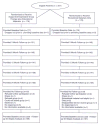Supportive-expressive group therapy for primary breast cancer patients: a randomized prospective multicenter trial
- PMID: 17935144
- PMCID: PMC3037799
- DOI: 10.1002/pon.1280
Supportive-expressive group therapy for primary breast cancer patients: a randomized prospective multicenter trial
Abstract
Objective: The aim is to evaluate the effectiveness of a manualized 12-week supportive-expressive group therapy program among primary breast cancer patients treated in community settings, to determine whether highly distressed patients were most likely to benefit and whether therapist's training or experience was related to outcome.
Method: Three hundred and fifty-three women within one year of diagnosis with primary breast cancer were randomly assigned to receive supportive-expressive group therapy or to an education control condition. Participants were recruited from two academic centers and nine oncology practices, which were members of NCI's Community Clinical Oncology Program (CCOP) and were followed over 2 years.
Results: A 2x2x19 analysis of variance was conducted with main effects of treatment condition, cohort, and baseline distress and their interactions. There was no main effect for treatment condition after removing one subject with an extreme score. Highly distressed women did not derive a greater benefit from treatment. Therapist training and psychotherapy experience were not associated with a treatment effect.
Conclusions: This study provides no evidence of reduction in distress as the result of a brief supportive-expressive intervention for women with primary breast cancer. Future studies might productively focus on women with higher initial levels of distress.
(c) 2007 John Wiley & Sons, Ltd.
Figures
Similar articles
-
Group psychotherapy for recently diagnosed breast cancer patients: a multicenter feasibility study.Psychooncology. 1999 Nov-Dec;8(6):482-93. doi: 10.1002/(sici)1099-1611(199911/12)8:6<482::aid-pon402>3.0.co;2-w. Psychooncology. 1999. PMID: 10607981 Clinical Trial.
-
Effects of supportive-expressive group therapy on pain in women with metastatic breast cancer.Health Psychol. 2009 Sep;28(5):579-87. doi: 10.1037/a0016124. Health Psychol. 2009. PMID: 19751084 Clinical Trial.
-
Supportive-expressive group therapy and distress in patients with metastatic breast cancer: a randomized clinical intervention trial.Arch Gen Psychiatry. 2001 May;58(5):494-501. doi: 10.1001/archpsyc.58.5.494. Arch Gen Psychiatry. 2001. PMID: 11343530 Clinical Trial.
-
The rationale and foundations of group psychotherapy for women with metastatic breast cancer.Int J Group Psychother. 1998 Apr;48(2):245-73. doi: 10.1080/00207284.1998.11491538. Int J Group Psychother. 1998. PMID: 9563240 Review.
-
A group therapy approach to facilitate integration of risk information for women at risk for breast cancer.Can J Psychiatry. 1998 May;43(4):375-80. doi: 10.1177/070674379804300405. Can J Psychiatry. 1998. PMID: 9598274 Review.
Cited by
-
Implementation and Benefits of Psychooncological Group Interventions in German Breast Centers: A Pilot Study on Supportive-Expressive Group Therapy for Women with Primary Breast Cancer.Breast Care (Basel). 2010;5(2):91-96. doi: 10.1159/000297739. Epub 2010 Apr 23. Breast Care (Basel). 2010. PMID: 20847820 Free PMC article.
-
The Effectiveness of Psychological Treatments in Women with Breast Cancer: A Systematic Review and Meta-Analysis.J Clin Med. 2020 Jan 12;9(1):209. doi: 10.3390/jcm9010209. J Clin Med. 2020. PMID: 31940942 Free PMC article. Review.
-
A qualitative study on mindfulness-based stress reduction for breast cancer patients: how women experience participating with fellow patients.Support Care Cancer. 2016 Apr;24(4):1813-20. doi: 10.1007/s00520-015-2954-8. Epub 2015 Oct 8. Support Care Cancer. 2016. PMID: 26446701 Free PMC article.
-
Finding My Way: protocol of a randomised controlled trial evaluating an internet self-help program for cancer-related distress.BMC Cancer. 2015 Apr 30;15:328. doi: 10.1186/s12885-015-1322-x. BMC Cancer. 2015. PMID: 25924674 Free PMC article. Clinical Trial.
-
Identifying tumor patients' depression.Support Care Cancer. 2011 Nov;19(11):1697-703. doi: 10.1007/s00520-010-1004-9. Epub 2010 Sep 19. Support Care Cancer. 2011. PMID: 20853171
References
-
- Gallagher J, Parle M, Cairns D. Appraisal and psychological distress six months after diagnosis of breast cancer. Br J Health Psychol. 2002;7(3):365–376. - PubMed
-
- Kissane D, Clarke D, Ikin J, et al. Psychological morbidity and quality of life in Australian women with early-stage breast cancer: a cross-sectional survey. Med J Aust. 1998;169(4):192–196. - PubMed
-
- Edgar L, Rosberger Z, Nowlis D. Coping with cancer during the first year after diagnosis. Cancer. 1992;69(3):817–828. - PubMed
-
- Goldberg JA, Scott RN, Davidson PM, et al. Psychological morbidity in the first year after breast surgery. Eur J Surg Oncol. 1992;18(4):327–331. - PubMed
-
- Stanton AL, Danoff-Burg S, Huggins ME. The first year after breast cancer diagnosis: hope and coping strategies as predictors of adjustment. Psycho-Oncology. 2002;11:93–102. - PubMed
Publication types
MeSH terms
Grants and funding
LinkOut - more resources
Full Text Sources
Medical


